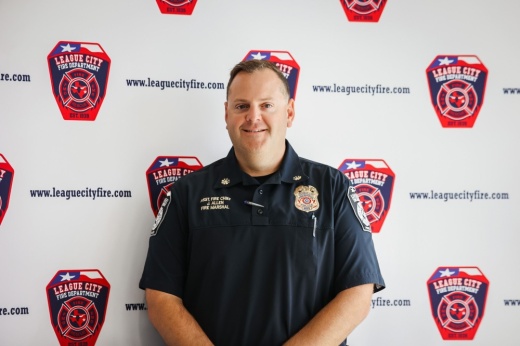That growth, as well as keeping up with staffing needs, will be some of what new League City Fire Chief Jeffrey Allen, who was appointed Oct. 4, will be focused on. Allen has been in public safety for 19 years and spent seven of those with League City, with his most recent role being the city’s assistant fire chief, according to city documents.
Allen spoke to Community Impact about staffing, response times, fire prevention and new projects in town. This interview has been cut for length, style and clarity.
What will your priorities be as fire chief?
The main priorities I have is ... how do we reduce our response times? That’s a big one and a big goal for the city. ... If we can shave off anything, 30 seconds is huge. And we’ve got a pretty decent response time right now. If we can make it better, that’s just better customer service we can provide for the citizens. The other one is going to be expanding recruitment efforts. ... On the fire side, the two biggest priorities are EMS [Emergency Medical Services] and working with our medical director to continue providing outstanding, progressive medical treatments. ... And continuing proactive prevention programs. Inspections, public education, community programs, talking to HOA’s [home owner associations]. ... If we can prevent one fire from happening, that’s phenomenal.
How can you reduce response times?
The city is growing, so in order to continue to provide a high quality service, we’ve got to grow in the volunteer service of it. Putting it into perspective, if we don’t build the seventh and eighth fire stations [on the west side] and there’s an incident that occurs on the west side of town, those trucks are going to be coming a lot further to go help for that, which then increases response times. Purely putting resources in the areas where they don’t exist currently because there wasn’t a need, is probably one of the biggest components of it.
With new projects, such as the new battery storage facility being approved, how is the department building up capabilities to respond to challenges with new industries coming into town?
With the battery storage facilities, part of that permitting process is ... they’re going to provide regular training. ... Any time there’s new technology, all of that comes down to relationship building between the city and the battery companies. ... They’re going to provide some air monitoring. The best systems are designed in certain ways to contain a major fire incident, to prevent that major fire incident. So they’ve got fail safes in places where, relatively speaking, the fire crew should never have to enter the grounds of the facility. ... It’s building those safety nets in the development of these programs that helps us to better understand them.
We’ve got a significantly diverse group of individuals that volunteer, who have a huge knowledge base in all sorts of different topics. We’ve got guys that are regularly dealing with battery sites in their full time job. Not only are we going to lean on the developer or business ... but we’ve also got guys in-house that are going to be able to provide training.
What’s the status of the two new fire stations being built?
Station 7, we’re working on a contract with an architect. Once we get a contract in place we can move forward with the programming and design of the station ... then move into development of it. But something to keep in mind is that we're planning fire stations right now in areas that don’t have streets yet. ... So one of the things that we have to balance is, how quick do we build? Because if we can’t get to it, then that’s an obvious issue. Or does the city build roads ahead of the development. Those are some of the things we have to look at and talk to [League City] City Council to see what the direction is going to be. The goal would be [to have a solid plan to move forward with] in this fiscal year.
As far as Station 8, Station 7 will come first, obviously, and then Station 8 will come after that. If I had to take a guess, we’ll probably build Station 7 and have that done and then start Station 8. I don’t foresee us trying to [build] two stations concurrently.





